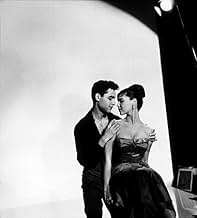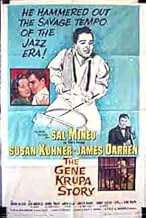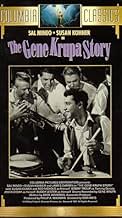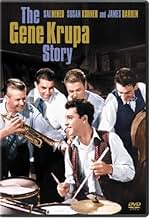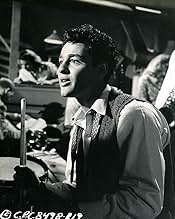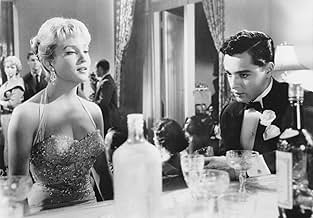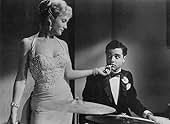NOTE IMDb
6,7/10
812
MA NOTE
Ajouter une intrigue dans votre langueBiopic of famous jazz drummer, Gene Krupa, who becomes a sensation but cannot handle success and life in the fast lane and ends-up broke, struggling with drugs and alcohol.Biopic of famous jazz drummer, Gene Krupa, who becomes a sensation but cannot handle success and life in the fast lane and ends-up broke, struggling with drugs and alcohol.Biopic of famous jazz drummer, Gene Krupa, who becomes a sensation but cannot handle success and life in the fast lane and ends-up broke, struggling with drugs and alcohol.
- Réalisation
- Scénario
- Casting principal
- Récompenses
- 1 victoire et 1 nomination au total
Stanley Adams
- Bar Owner
- (non crédité)
Marie Ardell
- Minor Role
- (non crédité)
Candy Barr
- Stripper
- (non crédité)
Arthur Berkeley
- Stagehand
- (non crédité)
John Bleifer
- Father
- (non crédité)
Avis à la une
Biography of penultimate jazz drummer Krupa (played here with enthusiasm by young Sal Mineo) as he achieves fame and fortune for his unique talent, then squanders his success on alcohol, illicit substances and loose women. Mineo is sharp and authentic-looking in his impersonations of the frenetic, almost chaotic looking drumming, while Kohner is his antithesis, a placid, mature girl who despite his lack of judgment and indiscretions, sticks by him, ultimately resurrecting his career after he's incarcerated for narcotics possession (in spite of his protests "they weren't my reefers!"). She encourages him to learn to read music, while his fair-weather friends encourage him to party to excess, his grip on the sticks stutters and concerns grow for his well being.
Larry Dobkin is Krupa's cool-as-cucumber attorney, but the trio of girls assembled to tempt Mineo (principally youthful Craig and sultry Oliver) are welcome distractions from the musical numbers (which are superbly choreographed and not over represented). Darren isn't bad as his trumpet-playing concerned friend and future "Love Boat" captain Gavin McLeod is on deck in a small role as Krupa's brother.
The subject matter is handled with conservatism and the drug dependency issue isn't really explored in any detail (the scene in which he rejects Oliver's offer of a doobie is a little cheesy, surely even by the contemporary standards). Still it's a bit more than a casual theme, and this is more than just a string of musical numbers loosely bound in a biopic melodrama. Mineo's performance is well balanced, while Kohner is appropriately understated and the musical numbers more than compensate for any particular lack of dramatic intensity. Worth a look.
Larry Dobkin is Krupa's cool-as-cucumber attorney, but the trio of girls assembled to tempt Mineo (principally youthful Craig and sultry Oliver) are welcome distractions from the musical numbers (which are superbly choreographed and not over represented). Darren isn't bad as his trumpet-playing concerned friend and future "Love Boat" captain Gavin McLeod is on deck in a small role as Krupa's brother.
The subject matter is handled with conservatism and the drug dependency issue isn't really explored in any detail (the scene in which he rejects Oliver's offer of a doobie is a little cheesy, surely even by the contemporary standards). Still it's a bit more than a casual theme, and this is more than just a string of musical numbers loosely bound in a biopic melodrama. Mineo's performance is well balanced, while Kohner is appropriately understated and the musical numbers more than compensate for any particular lack of dramatic intensity. Worth a look.
I recall seeing this as a teenager and thinking it was great. As a 75 year old retired musician who lives music history, it annoyed me.
When a producer allows a song from 1940 (Let There be Love) to be inserted into a scene from the mid20s I call foul. The early scene with Krupa jamming with the Austin High Gang is arranged in the style of a 1960s Las Vegas showband. The scene with Red Nichols is equally absurd with bop-based jazz chorus.
Then comes "Cherokee" (written in 1938) played at a tempo and style at least 20 years in the future. Then comes the cocktail party which looks like a scene from Playboy After Hours. No attempt is made to costume authenticity. The band jamming sounds like Sam Butera on speed.
Later a beautiful version of "Memories of You" appears, but sung in a style si,liar to Julie London. Not until "Back Home in Indiana" does the music come close to stylistically historical accuracy. But then the overdone "everybody has a drum" schtick even ruins that. "Hawaiian War Chant" provides some redemption, but not enough to change my sum total reaction to the film - meh!
As others have mentioned, the film was obviously marketed to teens. Unfortunately anyone who knows anything about Krupa, or the swing era, will likely find it annoying.
When a producer allows a song from 1940 (Let There be Love) to be inserted into a scene from the mid20s I call foul. The early scene with Krupa jamming with the Austin High Gang is arranged in the style of a 1960s Las Vegas showband. The scene with Red Nichols is equally absurd with bop-based jazz chorus.
Then comes "Cherokee" (written in 1938) played at a tempo and style at least 20 years in the future. Then comes the cocktail party which looks like a scene from Playboy After Hours. No attempt is made to costume authenticity. The band jamming sounds like Sam Butera on speed.
Later a beautiful version of "Memories of You" appears, but sung in a style si,liar to Julie London. Not until "Back Home in Indiana" does the music come close to stylistically historical accuracy. But then the overdone "everybody has a drum" schtick even ruins that. "Hawaiian War Chant" provides some redemption, but not enough to change my sum total reaction to the film - meh!
As others have mentioned, the film was obviously marketed to teens. Unfortunately anyone who knows anything about Krupa, or the swing era, will likely find it annoying.
Sal Mineo was a real so-so actor. Apart from his fresh, young looks, sweet face, deep eyes and athletic build, he was not more than a third rate version of some James Dean or even Elvis, who was a mediocre actor, too. Here, Sal tries to take on life of great late drummer (my personal musical favorite in jazz) Gane Krupa. Did Sal succeed? Nay, he did not. Gene was an affable, lovable, open-hearted man of integrity and skill. Sal is OK but not deeply convincing. Instead, he looks more like a talented, but hapless, selfish, spoiled man of some unripe masculinity. One thing is great for sure - Sal really knew how to play them drums well. Yes, real Gene Krupa recorded all the drum parts for the movie, but Sal mimicked them all with such a thrilling precision and skill that I, as a drummer myself, was awed. The love line is nothing more than a very typical 50's Hollywood kitsch palette of clichés and banality. Well, one more great thing is an outstanding jazz soundtrack with all the greats included. The film could have become a bigger and better thing, but all is jammed and packed in 100 minutes and the aftertaste is somewhat sour and bitter. Gene deserved a better impersonator, in fact. And the movie a better script.
Not historially accurate, but a great portrayal by Sal Mineo. He worked with Krupa for about 2 years before filming began. The only real flaw is that the music is a 1950's version of 1930's swing/jazz, and none of Krupa's hits of the 40's were really included. Nonetheless, the music is very good, with Mineo mimicing extremely accurately Krups's off screen drumming.
Sal Mineo, who made a career of played conflicted people, does a magnificent job in the biography of legendary drummer Gene Krupa.
Mineo, as Krupa, gets wonderful support from James Darren and Susan Kohner. 1959 was a remarkable year for Miss Kohner. It was that year where she received a best supporting actress nomination as the troubled daughter of Lana Turner's maid in that great film "Imitation of Life."
Krupa's family wanted him to enter the priesthood. However, Gene's calling was for being a drummer. As is the case with so many talented people, success came quickly and unable to handle it, Krupa descended into a life of drinking and using reefers. At a time, when there were investigations revolving about musicians and drugs, Krupa's career suffered from his conviction and serving time in prison.
While Mineo at age 20, may have been too young for the part, he does a very credible job as the tormented youth. Kohner, as his girlfriend, Ethel, never gave up on him even though he literally walked out on her before his troubles again. As she did in "Imitation of Life," Kohner shows her own emotional conflict. Her early retirement from films deprived Hollywood of an excellent talent.
We also lost a great talent, when Mineo, who would get possibly the best part of his career as Dov Landau,the following year, in "Exodus," was murdered in 1976.
Lawrence Dobkin, who in 1959, was an important player in the television series "The Untouchables," scores well here as a protégé of Krupa.
Celia Lovsky, who was so memorable in many old films, usually portraying elderly women, was wonderful in 2 scenes in portraying Krupa's disappointed but loving mother. Of course, a Jewish woman playing a Catholic mother, might have raised some eyebrows at that time.
This is an excellent film where the social mores of the time derailed Krupa's great talent and career.
Mineo, as Krupa, gets wonderful support from James Darren and Susan Kohner. 1959 was a remarkable year for Miss Kohner. It was that year where she received a best supporting actress nomination as the troubled daughter of Lana Turner's maid in that great film "Imitation of Life."
Krupa's family wanted him to enter the priesthood. However, Gene's calling was for being a drummer. As is the case with so many talented people, success came quickly and unable to handle it, Krupa descended into a life of drinking and using reefers. At a time, when there were investigations revolving about musicians and drugs, Krupa's career suffered from his conviction and serving time in prison.
While Mineo at age 20, may have been too young for the part, he does a very credible job as the tormented youth. Kohner, as his girlfriend, Ethel, never gave up on him even though he literally walked out on her before his troubles again. As she did in "Imitation of Life," Kohner shows her own emotional conflict. Her early retirement from films deprived Hollywood of an excellent talent.
We also lost a great talent, when Mineo, who would get possibly the best part of his career as Dov Landau,the following year, in "Exodus," was murdered in 1976.
Lawrence Dobkin, who in 1959, was an important player in the television series "The Untouchables," scores well here as a protégé of Krupa.
Celia Lovsky, who was so memorable in many old films, usually portraying elderly women, was wonderful in 2 scenes in portraying Krupa's disappointed but loving mother. Of course, a Jewish woman playing a Catholic mother, might have raised some eyebrows at that time.
This is an excellent film where the social mores of the time derailed Krupa's great talent and career.
Le saviez-vous
- AnecdotesWhen the film opened in Krupa's hometown of Chicago at the Schiller Theatre on January 15, 1960 both Gene Krupa and Sal Mineo were on hand to greet the public and sign "fan fotos."
- GaffesWhen we see Gene at his penthouse on Central Park, at the party one of the guests is Bix Beiderbecke. Bix died in 1931 and only ever played with Gene Krupa in Chicago. By the time Krupa made it in New York, Bix had already died.
- Citations
Gene Krupa: Who's the snake charmer?
Dorissa Dinell: Anita O'Day. Not bad - if you like talent.
- ConnexionsFeatured in Police Story: The Broken Badge (1978)
Meilleurs choix
Connectez-vous pour évaluer et suivre la liste de favoris afin de recevoir des recommandations personnalisées
Détails
- Durée1 heure 41 minutes
- Couleur
- Rapport de forme
- 1.66 : 1
Contribuer à cette page
Suggérer une modification ou ajouter du contenu manquant

Lacune principale
By what name was La Vie ardente de Gene Krupa (1959) officially released in India in English?
Répondre


